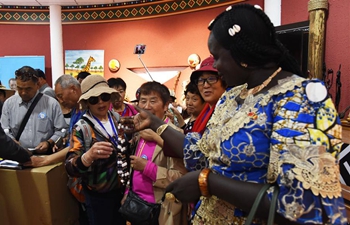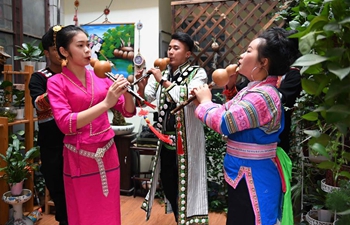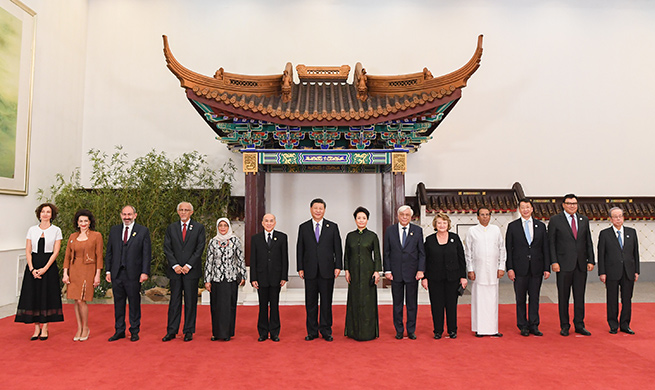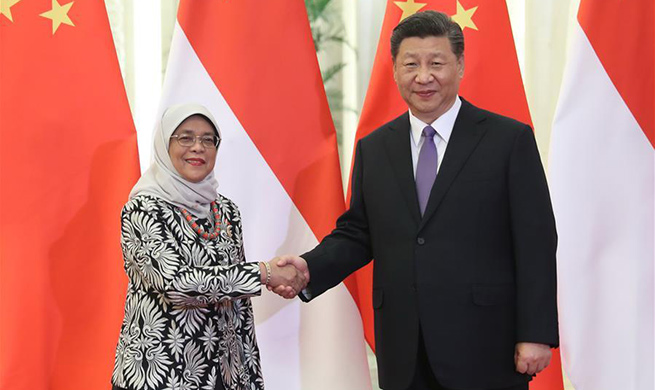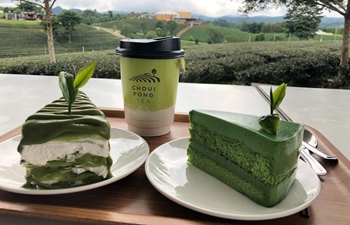NANCHANG, May 15 (Xinhua) -- Weaving bamboo strips back and forth in his deft hands, Xu Jianyuan continued to work until he had a beautiful piece of art, startling the crowd with his skilled and magical craftsmanship.
On his "bamboo painting," the portrait of Zeng Gong, an eminent poet living in today's Linchuan, east China's Jiangxi Province during the Song Dynasty (960-1279), seemed to come to life.
Surrounded by a group of visitors at a tour exhibition promoting local cultures, Xu, who has spent the past 37 years weaving bamboo strips in his hometown in Jiangxi, met his admirers from Douyin (Tik Tok), a popular online short video sharing platform.
"I was just an ordinary bamboo strip weaver, and never thought my works would be a big hit on the internet," Xu said.
He posted a short video clip showing his art and bamboo-weaving skills last November on the local government's Douyin account. To his surprise, the short video saw more than 6 million clicks and received some 200,000 likes.
People who saw his short videos on the platform came from other places to buy his handicrafts, which boosted his confidence. He made about 50,000 yuan (7,274 U.S. dollars) in the first quarter this year, as much as his annual sales in the past.
Local Chinese governments have been working with Douyin to promote intangible cultural heritages. Douyin launched a campaign in April to help inheritors demonstrate their crafts and better share the precious treasures.
Statistics from Douyin show that more than 24 million videos related to 1,214 intangible cultural heritages have appeared on its short video sharing platform as of April 2019, with a total of over 106.5 billion views.
Zhang Nan, president of Douyin, said they aim to make intangible heritage alive and allow the inheritors to live better lives.
The 52-year-old inheritor of Linchuan bamboo strip weaving, slightly greying at the temples, never gave up pursuing the ancient charm of the craft.
At the age of 16, Xu became a bamboo-weaver. Bamboo wares were quite popular at that time, at least one in four mastered the craft in his village of 1,000 residents.
"In the late 1980s, people worked the land during the busy farming season and made bamboo mats in their leisure time," he recalled.
Unfortunately, bamboo wares were shunned as plastic alternatives gained ground with much lower prices by the end of the 20th century. Xu stayed in his village as many bamboo weavers lost their jobs and left to find work.
Xu was told by his folks who came back from coastal regions that production efficiency had largely increased as factories began to implement large-scale mechanization, which meant less demand for hand-made bamboo mats.
Things became difficult for the craftsman's family. Xu and his wife worked more than 10 hours a day but weren't able to sell the mats they had made. The couple struggled to earn 10,000 yuan for a whole year's toil.
"I don't think handmade crafts should be antique, appealing only to a niche audience," Xu said.
Poverty makes people think of change. Instead of weaving bamboo mats and baskets, he chose to make high-quality works of art, which included portraits of great men, famous paintings like the "Riverside Scene at Qingming Festival," a masterpiece by Zhang Zeduan from the Song Dynasty.
The craft has earned a place on the list of provincial intangible cultural heritage in 2009 and Xu became its inheritor one year later. He set up a workshop that offered experiential courses to local schools and enterprises.
With the help of the "information dividend" on short video platforms, Xu is more ambitious and considering opening an online store with expected sales volume growing tenfold.
"The craft and wisdom of our ancestors cannot be lost," he said. "People's comments online encouraged me to go on, and it was worth it."




